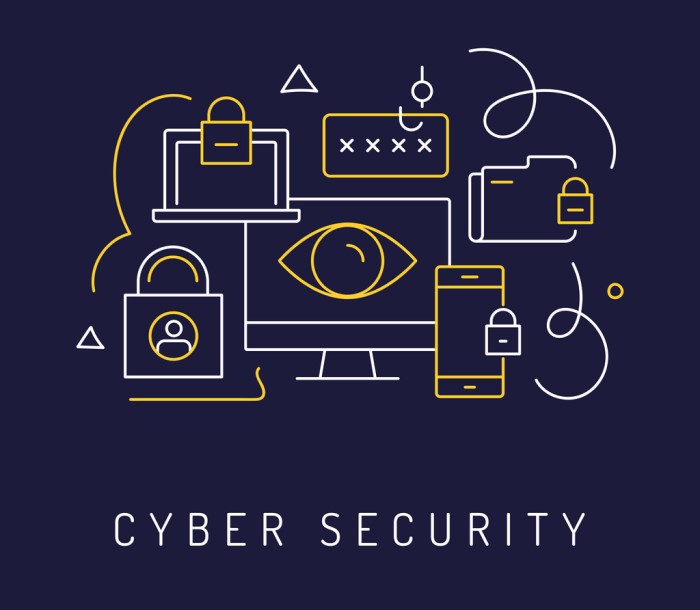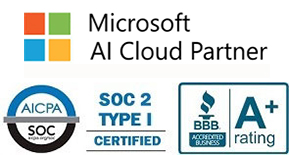
IT solutions help organizations streamline their business processes and protect confidential information. By implementing cyber security measures, you will have peace of mind knowing that your confidential data is safeguarded. However, it's important to implement different security measures to ensure that everything is fully secured. This article discusses the various types of cyber security that you can implement for your organization.
Network Security
Network security is a set of configurations and rules designed to protect networking infrastructure from unauthorized access or theft by using both hardware and software technologies. No matter the size or industry, all companies require network security solutions to protect them from cyber threats such as phishing attacks or malware.
In today's environment, network architecture can be complex, with attackers constantly looking to exploit any vulnerabilities to achieve their malicious goals. These vulnerabilities can exist in applications, data, and devices, making it crucial to choose a reliable company to manage your network security. Thankfully, there are various tools specifically designed to address particular threats, ensuring your data remains secure and protected.
How Network Security Works:
Network security involves several key considerations:
Network security is a crucial aspect of maintaining the integrity and confidentiality of an organization's data. Here's a more detailed look at the key considerations that ensure robust network security:
Policies and Controls: Implementing comprehensive policies and controls is foundational to network security. These guidelines serve as a blueprint for how security measures are applied and managed across the organization.
- Layered Security: By employing a multi-layered security strategy, businesses can create multiple barriers that help prevent unauthorized access. This may include both physical and software-based solutions such as secure gateways, intrusion detection systems, and data encryption.
- User Authentication and Authorization: Strong user authentication processes ensure that only authorized personnel have access to sensitive systems and data. This might involve multi-factor authentication (MFA), role-based access control (RBAC), and strict password policies.
- Segmentation and Isolation: By segmenting the network and isolating critical assets, organizations can limit the spread of potential attacks within the network. This means that even if one segment is compromised, the breach can be contained and prevented from spreading to other parts of the network.
Regular Updates and Monitoring: Cyber threats are constantly evolving, making it essential to keep network security measures up-to-date and to monitor them continuously.
- Patch Management: Regularly updating software and firmware with the latest patches is crucial. These updates fix vulnerabilities that could be exploited by attackers. A systematic patch management policy ensures that all components of the network are updated promptly.
- Continuous Monitoring: Utilizing advanced monitoring tools that track network traffic and user behavior can help detect anomalies that may indicate a security breach. Tools like Security Information and Event Management (SIEM) systems collect and analyze data from various network devices to identify potential security incidents.
- Incident Response: Developing an incident response plan is vital. This plan outlines how the organization will respond to detected security incidents. The faster a breach can be identified and contained, the less damage it will likely cause.
By focusing on these detailed aspects of network security, organizations can enhance their ability to protect against and respond to cyber threats, thereby safeguarding their valuable data and maintaining their reputation.
Effective Tools of Cyber Security
To enhance your network's defense, consider these security solutions:
- Firewalls: These devices monitor incoming and outgoing network traffic, allowing or blocking data packets based on security rules. Organizations can deploy threat-focused firewalls to actively prevent attacks. To authenticate communication between networks, a VPN may use Secure Sockets Layer.
- VPN (Virtual Private Network): A VPN encrypts your internet connection, making your online actions more secure and private. It helps prevent external parties from intercepting or viewing your data.
- Anti-Virus and Anti-Malware Software: These programs are essential for detecting and removing malicious software like worms, viruses, spyware, and Trojans that might infiltrate your network and lie dormant before causing damage.
- Access Control: This security measure restricts network access to authorized users only and can be customized to provide different access levels based on the user’s role within the organization.
Cloud Security
Cloud security is about protecting cloud-based systems, infrastructure, and data using a combination of policies, procedures, and technologies. It also plays a crucial role in maintaining customers' privacy and adhering to regulatory compliance. Cloud security solutions can be tailored to meet the specific needs of your organization.
Advantages of Cloud Security:
- Cost-Effectiveness: Using cloud services reduces the need for significant hardware investments, which in turn lowers capital expenditure.
- Automated Security: Cloud platforms come with built-in security measures, eliminating the need for extensive manual security configurations and reducing the operational burden on your team.
- High Reliability: Cloud security provides centralized protection for applications and data, which enhances overall security reliability and accessibility for authorized users.
Application Security
Application security involves measures taken to protect applications from threats. Given that cybercriminals are increasingly skilled at discovering and exploiting vulnerabilities, it is critical to implement robust security practices at the application level.
Effective application security can prevent unauthorized data modification and ensure the confidentiality of sensitive information. This type of security is necessary not just for desktop applications but also for mobile applications, which are often used on the go and may be more vulnerable to security breaches.
Types of Application Security Testing:
- Static Application Security Testing (SAST): This method scans application source code to pinpoint the root causes of vulnerabilities without executing the code.
- Dynamic Application Security Testing (DAST): Unlike SAST, DAST involves performing controlled attacks on running applications to identify vulnerabilities.
Operational Security
Also known as procedural security, operational security is a risk management process designed to prevent confidential and sensitive information from falling into the wrong hands. This type of security includes monitoring employee behavior and discouraging the unsafe sharing of login credentials.
Operational Security Process:
- Identify Sensitive Data: Determine what information needs protection, such as financial statements and intellectual property.
- Analyze Threats and Vulnerabilities: Regularly assess your security framework to identify and address weaknesses.
- Risk Assessment and Mitigation: Evaluate the potential impacts of identified risks and implement strategies to mitigate them.
The Importance of Having a Disaster Recovery Plan
In today’s digital age, having a robust disaster recovery plan (DRP) is not just advisable; it is imperative for safeguarding the continuity of business operations against unforeseen disasters and cyberattacks. This plan is a comprehensive documentation of procedures and measures designed to recover and protect a business's IT infrastructure in the event of a disaster.
Key Aspects of a Disaster Recovery Plan:
- Minimize Downtime: A well-crafted disaster recovery plan aims to minimize downtime and ensure that critical operations can continue with minimal interruption. This is vital for maintaining customer trust and avoiding the significant financial losses associated with extended periods of downtime.
- Data Protection: Central to the disaster recovery plan is data protection. The plan outlines strategies for backing up data regularly and storing backup copies both on-site and off-site. These backups ensure that data can be quickly restored to its most recent state, minimizing data loss and facilitating a return to normal operations.
- Risk Assessment: Regular risk assessments are integral to a disaster recovery plan. These assessments help identify potential threats to IT systems, such as natural disasters, cyberattacks, or power failures. Understanding these risks allows organizations to develop more targeted recovery strategies that address specific vulnerabilities.
- Clear Roles and Responsibilities: The plan delineates clear roles and responsibilities for staff members during a disaster. This ensures that everyone knows their tasks and how to execute them under pressure, which is crucial for an effective and coordinated response.
- Regular Testing and Updates: To ensure the disaster recovery plan remains effective and relevant, it must be tested and updated regularly. Simulated disasters and recovery drills can help uncover weaknesses in the plan and provide insights into necessary improvements. Additionally, as business operations and technologies evolve, the plan must evolve too to address new security challenges and operational needs.
Benefits of Implementing a Disaster Recovery Plan:
- Business Continuity: The primary benefit of a disaster recovery plan is the assurance of business continuity. By having predefined responses to various disaster scenarios, companies can reduce the time it takes to resume mission-critical functions, thus maintaining business continuity.
- Cost Savings: While setting up a disaster recovery plan requires an initial investment, the cost of not having one during a disaster can be far greater. Losses due to operational downtime, data loss, and the impact on customer satisfaction can dwarf the cost of maintaining a proactive disaster recovery strategy.
- Compliance and Legal Assurance: For many industries, having a disaster recovery plan is not just strategic; it’s also a compliance requirement. Regulatory bodies often require companies to have detailed disaster recovery plans to ensure the protection of sensitive customer data and maintain privacy standards.
- Reputation Management: In the event of a disaster, a company’s ability to recover quickly can significantly affect its reputation. A rapid and effective response can strengthen customer and stakeholder trust, whereas a failed or prolonged recovery can have a damaging impact on the company's public image.
Implementing, a disaster recovery plan is a critical component of an organization's risk management and cyber security strategy. It not only ensures the rapid restoration of IT services and data after a disaster but also supports the overall resilience and reliability of business operations. Organizations should regard disaster recovery not just as an IT concern but as a fundamental business imperative.
Contact Integrated Computer Services
We are an IT consulting service committed to designing, managing, and delivering exceptional technology solutions. Our dedicated IT support is available 24/7 to ensure your systems are continuously monitored. Let us help you design state-of-the-art cybersecurity solutions to keep your business data and applications secure. Please reach out to discuss your security needs and how we can assist you in achieving a safer digital environment.
About Us:
- 150+ 5-Star Google Rated IT Firm
- Microsoft Certified Cloud AI Partner
- SOC II Certified Managed Service Provider
- Better Business Bureau A+ Rated






